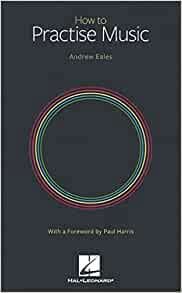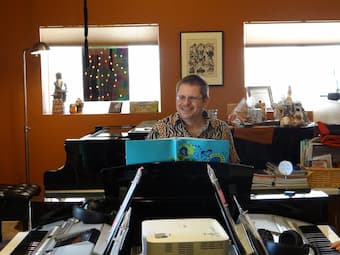 The expression “small but perfectly formed” is rather over-used, but in the case of this new book How to Practise Music (Hal Leonard) it is entirely apt. Written by Andrew Eales, a highly respected British music educator, piano teacher and writer, this pocket-sized volume is the perfect companion for every musician, packing a punch in less than 100 pages with its wealth of supportive, imaginative, practical and thoughtful suggestions to keep the musician, whatever their age or ability level, focused and motivated.
The expression “small but perfectly formed” is rather over-used, but in the case of this new book How to Practise Music (Hal Leonard) it is entirely apt. Written by Andrew Eales, a highly respected British music educator, piano teacher and writer, this pocket-sized volume is the perfect companion for every musician, packing a punch in less than 100 pages with its wealth of supportive, imaginative, practical and thoughtful suggestions to keep the musician, whatever their age or ability level, focused and motivated.
Practising is the musician’s “work” and all too often, especially for younger or early to intermediate level players, practising can really feel like hard work. Fortunately, the author, as a practicing piano teacher himself, really understands the challenges facing players – that the necessary rigour and self-discipline of the practice room can “potentially steal our joy and rob us of our potential” – and he responds to those challenges with this succinct guide to assist musicians of all levels and ages to become confident, self-motivated players, while also recognising the need to set realistic, achievable goals in the practice room, and to be kind to oneself.
Claude Debussy: 12 Etudes – No. 1. Pour les cinq doigts (For the five fingers) (Noriko Ogawa, piano)

Andrew Eales © Pianodao
The book is arranged in sections which cover everything from reasons for practicing and organising your practicing (it’s remarkable how many musicians, even more advanced ones, struggle to organise their practice time intelligently!) to warming up and how to practice core skills (scales and arpeggios, studies and exercises, reading music and sight-reading). Later sections give sound advice on selecting repertoire, background research, listening and “chunking” – intensive work on short sections of the music – as well as mindfulness in practising and sensible advice on how to practise for performance, including thoughts on interpretation, authenticity, memorising and managing performance anxiety. The author manages to be both authoritative and accessible in his suggestions – a rarity in a world still riven with didactic instructions and ingrained attitudes – making the text engaging and interesting to read. Throughout, there is emphasis on playfulness in practising, as well as mindfulness, reminding the player that practising need not be a chore and that one should always find joy in one’s music making – and this is the closing message in the epilogue of the book.
Claude Debussy: 12 Etudes – No. 11. Pour les arpeges composes (For written arpeggios) (Noriko Ogawa, piano)
This nugget-filled, little book of practise wisdom is small enough to keep by your side or in your pocket as you navigate your personal path through music. You may wish to read the book from cover to cover, or to simply dip into it; either way, you will find it an invaluable resource. Teachers too will find much useful information in finding creative ways to encourage students to practise.
For more of the best in classical music, sign up to our E-Newsletter



